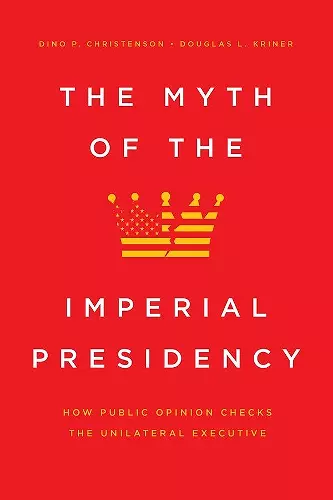The Myth of the Imperial Presidency
How Public Opinion Checks the Unilateral Executive
Douglas L Kriner author Dino P Christenson author
Format:Paperback
Publisher:The University of Chicago Press
Published:6th Jul '20
Should be back in stock very soon

Throughout the history of the United States, the nation's presidents have shown a startling power to act independently of Congress and the courts. Using such tools as executive orders and memoranda, presidents have taken the country to war, abolished slavery, authorized widespread electronic surveillance, shielded undocumented immigrants from deportation, and more. As a result, executive authority has at times been accused of verging on the imperial. In this book, Dino P. Christenson and Douglas L. Kriner consider an oft-overlooked question: Given the strength of unilateral executive action and the steep barriers for Congress and the courts to successfully check it, what stops presidents from asserting control even more broadly than they already do? The answer, Christenson and Kriner argue, lies in the reactions of everyday Americans. With robust empirical data and compelling case studies, the authors reveal the extent to which domestic public opinion limits executive might. Presidents are emboldened to pursue their own agendas when they enjoy high levels of public support, and constrained when they are down in the polls, as unilateral action could jeopardize future initiatives and render presidents even more politically vulnerable. Although they find little evidence that the public instinctively recoils against the use of unilateral action, Congress and the courts can sway the public's view via their criticism of unilateral policies. Thus, other branches can still check the executive branch through political means. On the whole, as long as presidents are concerned with public opinion, Christenson and Kriner contend that fears of an imperial presidency are overblown. However, a president who responds only to the narrow base and ignores the mass public could pose a unique threat to checks and balances.
"If unilateralism is so tempting and so effective, Christenson and Kriner ask, why is it so rare? The key dynamics, they show, are less in other branches of government but in politics and public opinion. Christenson and Kriner unify strands of presidency research that have been treated by too many as competitors and even as opposites, and the book will make a crucial contribution."--Andrew Rudalevige, Bowdoin College "American democracy only works if the populace controls those who they elect. There is no more fundamental question then whether citizens can in fact exert such control. Yet, for more than one hundred years, scholars and pundits have worried about an imperial presidency that evades institutional and popular checks. This seminal book offers remarkable evidence that the public--with the help of the Congress and the courts--do in fact hold the president accountable. In that sense, democracy can work and has worked. Alas, the book also points to concerns of responsiveness to a narrow base. In so doing, Christenson and Kriner not only resolve a hundred-year-old puzzle but also set an agenda for the next generation of scholarship on American democracy."--James N. Druckman, Northwestern University
ISBN: 9780226704364
Dimensions: unknown
Weight: unknown
240 pages